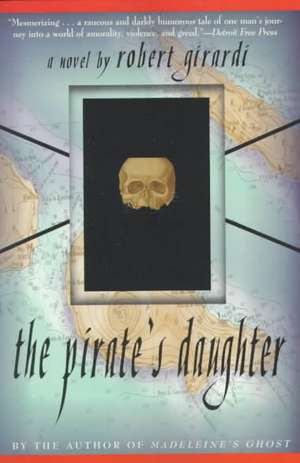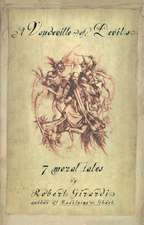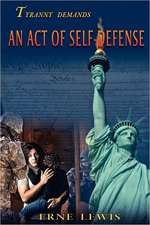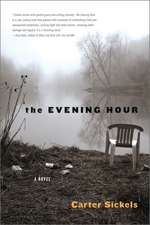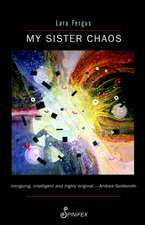The Pirate's Daughter: A Novel of Adventure
Autor Robert Girardien Limba Engleză Paperback – 30 sep 1997
Coming ashore in a world of searing mystery and danger, Lander will pay the price for his unquenchable desire for Cricket Page, for their moments of stolen pleasure and her cryptic promises of a life of luxury together. For she is a pirate's daughter, and in an exotic land exploding with cruelty and violence, populated by maniacs and plunderers, Wilson Lander must escape the woman who has stolen his heart--and given him his freedom. . . .
Preț: 115.51 lei
Nou
Puncte Express: 173
Preț estimativ în valută:
22.10€ • 23.14$ • 18.29£
22.10€ • 23.14$ • 18.29£
Carte disponibilă
Livrare economică 15-29 martie
Preluare comenzi: 021 569.72.76
Specificații
ISBN-13: 9780385319522
ISBN-10: 0385319525
Pagini: 336
Dimensiuni: 142 x 215 x 20 mm
Greutate: 0.43 kg
Editura: DELTA
ISBN-10: 0385319525
Pagini: 336
Dimensiuni: 142 x 215 x 20 mm
Greutate: 0.43 kg
Editura: DELTA
Extras
Coming home from work one Monday evening in August, Wilson Lander found two tarot cards face up on a side street of the out-of-the-way neighborhood where he lived. They were the Emperor and the Page of Wands. In the peculiar light of that hour, the cards seemed to glow with hidden meaning, two bright rectangles against the dull brick pavement.
Wilson paused, loosened his tie, bent toward them. The empty street ticked like a clock. The Emperor showed a stern white-bearded old man perched on a throne set against an arid mountainous landscape that looked like Africa. The Roman numeral IV floated in the sky over the head of this mysterious potentate. The Page of Wands was a young man wearing a red cloak and holding a wooden quarterstaff from which new leaves were sprouting. In the far distance, the same dry African-looking peaks.
Wilson studied the cards for almost five minutes, a curious prickling at the back of his neck. He was not an irrational man, but a tragic childhood had colored his adult life with a pervasive sense of dread. Dread was a way of life for Wilson Lander. He breathed it in as air, he wore dread as other men wear underpants and socks, and so he took the tarot cards as a sign of terrible events to come. Almost without thinking, he scooped them up and put them in the breast pocket of his blazer.
"This thing could mean good luck," he announced to the blank facades of the warehouses, to the emulsion stink in the air. "Why the hell not? Luck can be good or bad just as easily . . ." But he was a man who did not usually talk to himself, and he did not believe his own bravado. How did the cards get there in the first place? During the day, the streets of the Rubicon District were full of tough, plaid-shirted truck drivers and factory workers in steel-toed boots--not the sort of men to be fooling around with superstitious nonsense. Dread sounded in Wilson's head like a great bell ringing the Angelus.
Later, in his small apartment overlooking the wharves of the Black Star Line in the Harvey Channel, Wilson tried to forget about the tarot cards. He drank a beer, watched the news, made himself a quesadilla and salad for dinner, and got into bed early, in his pajamas. The small bedroom pooled with fading blue light. The sense of dread was so strong now it made his stomach hurt. He lay sleepless for hours beneath the thin sheets, listening to the rattle of the air-conditioning unit in the window, imagining his mortality taking shape just beyond the thin membrane of mundane events. Growing claws, sprouting feathers and scales, a monster on the other side in the eschatological gloom.
The next day, Wilson called his girlfriend and told her he would not be coming to work.
"What is it this time?" Andrea said, her voice tight through the crackle of her portable phone. "Another panic attack?"
"Don't ask me to explain," Wilson said, not wanting to tell her about the tarot cards.
"Because, you know, they make pills for anxiety. I read that anxiety comes from a buildup of the wrong kind of chemicals in the brain. You swallow one pill, and it lifts like a cloud."
"That's just not true," Wilson said.
"I'm really worried about you," Andrea said, softening a little. "You should go back to that therapist."
"Don't start," Wilson said.
Andrea believed Wilson's sense of dread was a sickness, like the flu, that could be cured through subtle alterations of brain chemistry with mood-altering drugs. He saw it as something far more spectacular, an epic curse borne through the generations: When Wilson was nine, his father perished in the famous wreck of the four forty-five, an overcrowded express train that derailed and plunged off the Trohog Bridge into the Potswahnamee River; less than a year later his mother was crushed to death in a bizarre accident. And there had been a great-uncle--the details were sketchy--who had gone to seek his fortune in the diamond mines of Peru a half century before and disappeared without a trace.
"Just give me a day," Wilson said. "I'll be fine tomorrow."
A tense silence followed in which Wilson heard the faint computerized rattle of Andrea's office and the traffic coming along Commerce Avenue and her even breath. At last she gave a sigh and a hard "Fine--see you first thing in the morning," and hung up the phone.
Andrea was Wilson's employer as well as his lover. A junior vice-president at the Tea Exchange, a small but respected brokerage firm in the Financial Mile, she dealt in commodities futures on minerals at the bottom of the sea, on herds of cattle in Bolivia, on boatloads full of big blue tiger shrimp from the Marianas Trench, on silos of barley in the Ukraine--everything except tea. She had hired Wilson as her executive assistant the year before when he couldn't find a job, but as everyone knows, professionalism and passion don't mix. Things had been a little cool between them of late. The job was an act of kindness they both had come to regret.
Wilson ate a sober bowl of bran cereal for breakfast, dressed in unobtrusive gray clothes, and took the eleven o'clock bus over the bridge into the city.
From Metropolitan Terminal, he walked up twenty blocks to an odd little store tucked away between a new French restaurant and a warehouse full of rubber bands in a dark canyon of a street, in a part of the city that was just becoming trendy. The store was marked only by an orange banner of a silhouetted witch on a broom. Its small display window contained a few ancient tomes with faded gilt bindings, ceramic canisters full of unspecified herbs, and, most remarkably, a dusty stuffed monkey wearing a fez and dressed in a red velvet robe embroidered with pentagrams and half-moons. The monkey bared blackened teeth at the passerby, its eyes were sewn shut, and mange or termites had eaten away half the fur, revealing shiny dark skin hard as asphalt.
Wilson stared at this grisly relic through the grime-streaked glass. A police cruiser inched by along the curb behind him; a step van full of rubber bands bounced over a pothole. A yellow banner showing a bottle of wine and a clove of garlic flapped noisily above the French restaurant next door. New city ordinances enforced banners over any other kind of sign for this district, perhaps seeking to invoke an atmosphere of medieval trade guilds and painstaking handcraftsmanship. Then, Wilson noticed the reflection of his own face in the glass, worried, specter pale.
The store formed a long, triangular cave that narrowed to a point at the back. A fat orange cat eyed Wilson from a pink pillow near the door as he stepped inside. On one wall hung cast iron cauldrons of different sizes, pewter charms in stapled Baggies, bundles of dried roots. Against the other wall, shelves of books with titles like Rune Casting Made Easy, Orgasming with the Goddess, Witchcraft and Lesbianism, Sorcery in 101 Easy Lessons. At the counter in the middle, a young woman sat balanced on a stool, painting her toenails. Wilson approached cautiously; he was the only customer. A loud, sonorous chanting vibrated from the sound system.
"Excuse me, I was wondering if I could ask you a favor," Wilson began.
The young woman looked up, and Wilson forgot himself. She was very pretty, with sea green eyes and a tangle of windblown coppery hair. Her skin was tanned except for a raccoon mask of whiteness where sunglasses had been. Her lips were chapped. She wore a pair of white cotton drawstring pants and a hooded sweatshirt that read USS William Eaton over the left breast. She didn't look at all like the kind of person you would expect to find working in a place like that. She looked like she belonged on the deck of a ship somewhere off the Cape Verde Islands as a fine salt spray washed over the gunwales and the sky went dark with storm.
"O.K.," the young woman said, frowning, "speak."
"Are you--do you . . . answer questions?" Wilson cast a helpless glance around at the love philters and voodoo dolls hanging from the ceiling.
"Jungle Red," the young woman said, screwing the cap back on the bottle of nail polish and waving it in his direction. "What do you think?" She held up her newly painted toes.
"Nice," Wilson said.
"Don't worry," the woman said. "I can answer any questions you might have."
Wilson took the two tarot cards out of his pocket and laid them on the counter at right angles to each other. "I found them, like that, in the street on my way home."
"The Emperor, the Page of Wands," she said. "Major Arcana, Minor Arcana."
"I don't believe in any of this stuff, of course," Wilson said, "but what the hell. Could mean something, right?"
The young woman stared up at him for a long moment with her raccoon eyes. Wilson squirmed uncomfortably beneath this scrutiny. His intellect knew a couple of cards found on the street couldn't predict the future, but his dread had other ideas.
"O.K. I'll need to find out a few things before I can give you an informed opinion," the young woman said, nodding at the cards. "Your moon sign, your sun sign, your shoe size. Your likes and dislikes, your favorite color, the exact day, hour, and minute of your birth, whether you have any distinguishing marks on your body, whether you came out of the womb with a caul over your face or butt first."
"A caul?"
"Yes. It's a thin membrane of embryonic tissue that in a small percentage of births covers the newborn's face when it emerges from the birth canal. A caul can mean that the child is marked by fate, that it has been signaled out for good luck or bad luck, but in either case certain sensitivities are bound to be inherent."
"A caul . . . I don't know."
"Ask your mother."
"She's dead."
"What about your father?"
"He's dead too," Wilson said.
"What did he do for a living?"
"Is this relevant?" Wilson said.
"Of course," the young woman said. "Everything is relevant."
Wilson hesitated. "Actually, he was a gambler."
"Professional?" She suddenly looked interested. Her eyes flickered with a secret intelligence.
"Yes," Wilson said, slightly embarrassed.
"Was he good?"
Wilson shrugged. "He made money at it."
"How much money?"
"Look . . ."
"Are you a gambler too?"
Wilson shook his head emphatically. "Not me. I work in an office."
"You've never gambled?" She seemed disappointed.
"I've played a few hands of poker."
"Ever lost?"
"Come to think of it, no."
The young woman smiled, and there was something behind the smile that Wilson found uncomfortable and thrilling at once, and there was a knot in his stomach when he looked at her that was not the dread at all.
The woman pushed the cards around the glass counter with the tips of her fingers. Her brow wrinkled in concentration. Wilson could almost hear the gears working. "Let's get on with this," she said. "Can you tell me if you wear boxers or Jockeys?"
"Boxers," Wilson said, before he realized that she was making fun of him. "Thanks for your help," he said, and gathered the cards and went quickly out onto the sidewalk. But then he saw the garlic clove and wine bottle floating in the breeze next door, and he felt his stomach knot up again and he stepped back inside.
"Do you want to go to lunch?" Wilson said from the safe distance of the doorway.
"If it's someplace close," the young woman said.
Wilson paused, loosened his tie, bent toward them. The empty street ticked like a clock. The Emperor showed a stern white-bearded old man perched on a throne set against an arid mountainous landscape that looked like Africa. The Roman numeral IV floated in the sky over the head of this mysterious potentate. The Page of Wands was a young man wearing a red cloak and holding a wooden quarterstaff from which new leaves were sprouting. In the far distance, the same dry African-looking peaks.
Wilson studied the cards for almost five minutes, a curious prickling at the back of his neck. He was not an irrational man, but a tragic childhood had colored his adult life with a pervasive sense of dread. Dread was a way of life for Wilson Lander. He breathed it in as air, he wore dread as other men wear underpants and socks, and so he took the tarot cards as a sign of terrible events to come. Almost without thinking, he scooped them up and put them in the breast pocket of his blazer.
"This thing could mean good luck," he announced to the blank facades of the warehouses, to the emulsion stink in the air. "Why the hell not? Luck can be good or bad just as easily . . ." But he was a man who did not usually talk to himself, and he did not believe his own bravado. How did the cards get there in the first place? During the day, the streets of the Rubicon District were full of tough, plaid-shirted truck drivers and factory workers in steel-toed boots--not the sort of men to be fooling around with superstitious nonsense. Dread sounded in Wilson's head like a great bell ringing the Angelus.
Later, in his small apartment overlooking the wharves of the Black Star Line in the Harvey Channel, Wilson tried to forget about the tarot cards. He drank a beer, watched the news, made himself a quesadilla and salad for dinner, and got into bed early, in his pajamas. The small bedroom pooled with fading blue light. The sense of dread was so strong now it made his stomach hurt. He lay sleepless for hours beneath the thin sheets, listening to the rattle of the air-conditioning unit in the window, imagining his mortality taking shape just beyond the thin membrane of mundane events. Growing claws, sprouting feathers and scales, a monster on the other side in the eschatological gloom.
The next day, Wilson called his girlfriend and told her he would not be coming to work.
"What is it this time?" Andrea said, her voice tight through the crackle of her portable phone. "Another panic attack?"
"Don't ask me to explain," Wilson said, not wanting to tell her about the tarot cards.
"Because, you know, they make pills for anxiety. I read that anxiety comes from a buildup of the wrong kind of chemicals in the brain. You swallow one pill, and it lifts like a cloud."
"That's just not true," Wilson said.
"I'm really worried about you," Andrea said, softening a little. "You should go back to that therapist."
"Don't start," Wilson said.
Andrea believed Wilson's sense of dread was a sickness, like the flu, that could be cured through subtle alterations of brain chemistry with mood-altering drugs. He saw it as something far more spectacular, an epic curse borne through the generations: When Wilson was nine, his father perished in the famous wreck of the four forty-five, an overcrowded express train that derailed and plunged off the Trohog Bridge into the Potswahnamee River; less than a year later his mother was crushed to death in a bizarre accident. And there had been a great-uncle--the details were sketchy--who had gone to seek his fortune in the diamond mines of Peru a half century before and disappeared without a trace.
"Just give me a day," Wilson said. "I'll be fine tomorrow."
A tense silence followed in which Wilson heard the faint computerized rattle of Andrea's office and the traffic coming along Commerce Avenue and her even breath. At last she gave a sigh and a hard "Fine--see you first thing in the morning," and hung up the phone.
Andrea was Wilson's employer as well as his lover. A junior vice-president at the Tea Exchange, a small but respected brokerage firm in the Financial Mile, she dealt in commodities futures on minerals at the bottom of the sea, on herds of cattle in Bolivia, on boatloads full of big blue tiger shrimp from the Marianas Trench, on silos of barley in the Ukraine--everything except tea. She had hired Wilson as her executive assistant the year before when he couldn't find a job, but as everyone knows, professionalism and passion don't mix. Things had been a little cool between them of late. The job was an act of kindness they both had come to regret.
Wilson ate a sober bowl of bran cereal for breakfast, dressed in unobtrusive gray clothes, and took the eleven o'clock bus over the bridge into the city.
From Metropolitan Terminal, he walked up twenty blocks to an odd little store tucked away between a new French restaurant and a warehouse full of rubber bands in a dark canyon of a street, in a part of the city that was just becoming trendy. The store was marked only by an orange banner of a silhouetted witch on a broom. Its small display window contained a few ancient tomes with faded gilt bindings, ceramic canisters full of unspecified herbs, and, most remarkably, a dusty stuffed monkey wearing a fez and dressed in a red velvet robe embroidered with pentagrams and half-moons. The monkey bared blackened teeth at the passerby, its eyes were sewn shut, and mange or termites had eaten away half the fur, revealing shiny dark skin hard as asphalt.
Wilson stared at this grisly relic through the grime-streaked glass. A police cruiser inched by along the curb behind him; a step van full of rubber bands bounced over a pothole. A yellow banner showing a bottle of wine and a clove of garlic flapped noisily above the French restaurant next door. New city ordinances enforced banners over any other kind of sign for this district, perhaps seeking to invoke an atmosphere of medieval trade guilds and painstaking handcraftsmanship. Then, Wilson noticed the reflection of his own face in the glass, worried, specter pale.
The store formed a long, triangular cave that narrowed to a point at the back. A fat orange cat eyed Wilson from a pink pillow near the door as he stepped inside. On one wall hung cast iron cauldrons of different sizes, pewter charms in stapled Baggies, bundles of dried roots. Against the other wall, shelves of books with titles like Rune Casting Made Easy, Orgasming with the Goddess, Witchcraft and Lesbianism, Sorcery in 101 Easy Lessons. At the counter in the middle, a young woman sat balanced on a stool, painting her toenails. Wilson approached cautiously; he was the only customer. A loud, sonorous chanting vibrated from the sound system.
"Excuse me, I was wondering if I could ask you a favor," Wilson began.
The young woman looked up, and Wilson forgot himself. She was very pretty, with sea green eyes and a tangle of windblown coppery hair. Her skin was tanned except for a raccoon mask of whiteness where sunglasses had been. Her lips were chapped. She wore a pair of white cotton drawstring pants and a hooded sweatshirt that read USS William Eaton over the left breast. She didn't look at all like the kind of person you would expect to find working in a place like that. She looked like she belonged on the deck of a ship somewhere off the Cape Verde Islands as a fine salt spray washed over the gunwales and the sky went dark with storm.
"O.K.," the young woman said, frowning, "speak."
"Are you--do you . . . answer questions?" Wilson cast a helpless glance around at the love philters and voodoo dolls hanging from the ceiling.
"Jungle Red," the young woman said, screwing the cap back on the bottle of nail polish and waving it in his direction. "What do you think?" She held up her newly painted toes.
"Nice," Wilson said.
"Don't worry," the woman said. "I can answer any questions you might have."
Wilson took the two tarot cards out of his pocket and laid them on the counter at right angles to each other. "I found them, like that, in the street on my way home."
"The Emperor, the Page of Wands," she said. "Major Arcana, Minor Arcana."
"I don't believe in any of this stuff, of course," Wilson said, "but what the hell. Could mean something, right?"
The young woman stared up at him for a long moment with her raccoon eyes. Wilson squirmed uncomfortably beneath this scrutiny. His intellect knew a couple of cards found on the street couldn't predict the future, but his dread had other ideas.
"O.K. I'll need to find out a few things before I can give you an informed opinion," the young woman said, nodding at the cards. "Your moon sign, your sun sign, your shoe size. Your likes and dislikes, your favorite color, the exact day, hour, and minute of your birth, whether you have any distinguishing marks on your body, whether you came out of the womb with a caul over your face or butt first."
"A caul?"
"Yes. It's a thin membrane of embryonic tissue that in a small percentage of births covers the newborn's face when it emerges from the birth canal. A caul can mean that the child is marked by fate, that it has been signaled out for good luck or bad luck, but in either case certain sensitivities are bound to be inherent."
"A caul . . . I don't know."
"Ask your mother."
"She's dead."
"What about your father?"
"He's dead too," Wilson said.
"What did he do for a living?"
"Is this relevant?" Wilson said.
"Of course," the young woman said. "Everything is relevant."
Wilson hesitated. "Actually, he was a gambler."
"Professional?" She suddenly looked interested. Her eyes flickered with a secret intelligence.
"Yes," Wilson said, slightly embarrassed.
"Was he good?"
Wilson shrugged. "He made money at it."
"How much money?"
"Look . . ."
"Are you a gambler too?"
Wilson shook his head emphatically. "Not me. I work in an office."
"You've never gambled?" She seemed disappointed.
"I've played a few hands of poker."
"Ever lost?"
"Come to think of it, no."
The young woman smiled, and there was something behind the smile that Wilson found uncomfortable and thrilling at once, and there was a knot in his stomach when he looked at her that was not the dread at all.
The woman pushed the cards around the glass counter with the tips of her fingers. Her brow wrinkled in concentration. Wilson could almost hear the gears working. "Let's get on with this," she said. "Can you tell me if you wear boxers or Jockeys?"
"Boxers," Wilson said, before he realized that she was making fun of him. "Thanks for your help," he said, and gathered the cards and went quickly out onto the sidewalk. But then he saw the garlic clove and wine bottle floating in the breeze next door, and he felt his stomach knot up again and he stepped back inside.
"Do you want to go to lunch?" Wilson said from the safe distance of the doorway.
"If it's someplace close," the young woman said.
Recenzii
"Mesmerizing . . . a raucous and darkly humorous tale of one man's journey into a world of amorality, violence, and greed."
--Detroit Free Press
"Intensely atmospheric . . . Timeless in its sensual tone . . . Wonderfully entertaining."
--Publishers Weekly
"Thrilling and imaginative . . . [The Pirate's Daughter] is great fun. I enjoyed it so much I read it in one swift sitting."
--The Times (London)
--Detroit Free Press
"Intensely atmospheric . . . Timeless in its sensual tone . . . Wonderfully entertaining."
--Publishers Weekly
"Thrilling and imaginative . . . [The Pirate's Daughter] is great fun. I enjoyed it so much I read it in one swift sitting."
--The Times (London)
Descriere
Wilson Lander suffers from constant "dread" of disaster. When he meets a reckless female sailor named Cricket, Wilson throws caution to the winds and joins Cricket on a boat trip around the world. But Wilson finds navigating Cricket's dark heart more challenging than navigating the ocean. An epic adventure from the acclaimed author of "Madeleine's Ghost".
Notă biografică
Robert Girardi was educated at Catholic schools in Europe and at the University of Virginia in Charlottesville. He holds an MFA from the University of Iowa Writers' Workshop and was a recipient of a James Michener Fellowship in 1989. He lives in Washington, DC.
